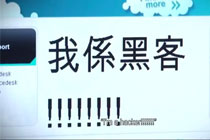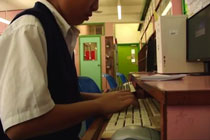
Bad Luck on the Internet
Sally likes to shop online and surf around but she seems to be having bad luck. She bought counterfeit product and was cheated by a fake online bidding post. Even making comments on other posts seems to get her into trouble. Is Sally a victim of various crimes?

The Invisible Thief
Andy is a Computer Science student who likes to study hacking and computer security. One day, he hacked into a company’s computer system, deleted some contents from the company’s website, and copied some clients’ information. What will he do with those clients’ information?

The Teacher’s Password
Chi Ming, a Form 3 student, has got hold of his teacher’s (Mr. Leung) intranet password by accident. What will Chi Ming do with the password?

Jilted Lover’s bomb
Hoi suspected that his girlfriend was having an affair with someone else. By correctly guessing the password for his girlfriend’s email account, he managed to log in to his girlfriend’s email account and found out the cruel truth. Hoi decided to take revenge…

Illegal e-Life
Him works in a hospital and has a boring life. He likes to download and upload pop music, movies and TV programmes to share with others on the Internet. Him never intended to share the hospital patient’s information with others, but he did it by accident.